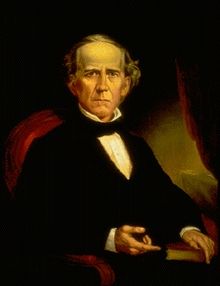Joseph A. Wright
| Joseph Albert Wright | |
|---|---|
 |
|
|
United States Senator from Indiana |
|
|
In office February 24, 1862 – January 14, 1863 |
|
| Preceded by | Jesse D. Bright |
| Succeeded by | David Turpie |
| United States Envoy Extraordinary and Minister Plenipotentiary to Prussia | |
|
In office September 3, 1865 – May 11, 1867 |
|
| President | Andrew Johnson |
| Preceded by | Norman B. Judd |
| Succeeded by | George Bancroft |
|
In office September 3, 1857 – July 1, 1861 |
|
| President | James Buchanan |
| Preceded by | Peter Dumont Vroom |
| Succeeded by | Norman B. Judd |
| 10th Governor of Indiana | |
|
In office December 5, 1849 – January 12, 1857 |
|
| Lieutenant |
James H. Lane Ashbel P. Willard |
| Preceded by | Paris C. Dunning |
| Succeeded by | Ashbel P. Willard |
| Member of the U.S. House of Representatives from Indiana's 7th district | |
|
In office March 4, 1843 – March 3, 1845 |
|
| Preceded by | Henry S. Lane |
| Succeeded by | Edward W. McGaughey |
| Member of the Indiana House of Representatives | |
|
In office 1832 |
|
| Personal details | |
| Born | April 17, 1810 Washington, Pennsylvania |
| Died | May 11, 1867 (aged 57) Berlin, Prussia |
| Political party | Democratic |
| Spouse(s) | Louisa Cook Harriett Burbridge Caroline Rockwill |
| Alma mater | Indiana University-Bloomington |
| Religion | Methodist |
Joseph Albert Wright (April 17, 1810 – May 11, 1867) was the tenth Governor of the U.S. state of Indiana from December 5, 1849 to January 12, 1857, most noted for his opposition to banking. His positions created a rift between him and the Indiana General Assembly who overrode all of his anti-banking vetoes. He responded by launching legal challenges to the acts, but was ruled against by the Indiana Supreme Court. The state's second constitutional convention was held during 1850-1851 in which the current Constitution of Indiana was drafted. He was a supporter of the new constitution and gave speeches around the state urging its adoption. He was opposed throughout his term by Senator Jesse D. Bright, the leader of the state Democratic Party.
After his term as governor, he was appointed to serve as United States Envoy Extraordinary and Minister Plenipotentiary to Prussia where he served until the outbreak of the American Civil War. Although he was a Democrat, he was openly pro-Union during the war, and was elected to serve as a United States Senator, filling the term of Copperhead Jesse D. Bright, who was expelled from the Senate for disloyalty. Following the war he was reappointed to his ambassadorial post where he remained until his death in Berlin, Prussia.
Joseph Albert Wright was born in Washington, Pennsylvania on April 17, 1810 the son of John and Rachel Seaman Wright. He moved with his family to Bloomington, Indiana in 1820, where he attended public school. His father was a bricklayer, and worked as one of the laborers who built the first halls of Indiana State Seminary (now Indiana University). He was the brother of future Iowa Senator George G. Wright. His father died when he was fourteen, and his family become impoverished. Wright worked as a janitor, bell ringer, and occasional bricklayer, in order to pay for his schooling and provide income for his family.
...
Wikipedia
